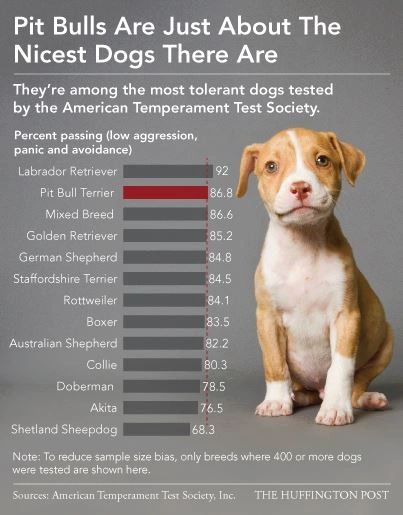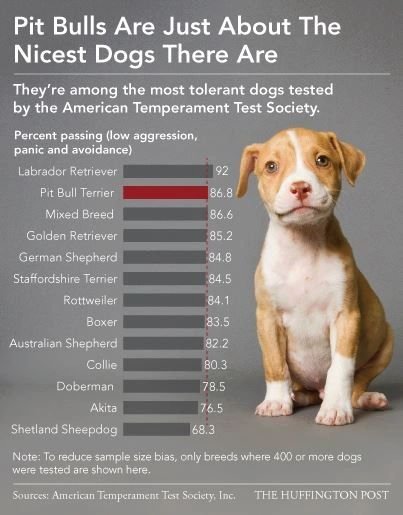Contrary to popular belief, pitbulls are not inherently aggressive. In fact, a study conducted by the American Temperament Test Society found that pitbulls have a higher passing rate in temperament tests than many other popular dog breeds. So why do they have such a notorious reputation?
While pitbulls were originally bred for dog fighting, it is important to note that aggression is a learned behavior, not a breed characteristic. Responsible ownership, proper socialization, and training are vital in shaping a pitbull’s behavior and temperament. It is unfair to label the entire breed as aggressive based on the actions of a few individuals. Education and understanding are key to challenging the misconceptions surrounding pitbulls and promoting responsible dog ownership.
Are Pitbulls an Aggressive Breed?
Pitbulls have been unfairly labeled as aggressive. However, breed misconceptions can lead to discrimination against these dogs. While individual temperaments may vary, Pitbulls can be loving, loyal, and gentle when properly trained and socialized. It’s important to remember that any breed can exhibit aggression if mistreated or improperly trained. Responsible ownership, positive reinforcement training, and early socialization are key to raising a well-behaved Pitbull.

Is Pitbull an Aggressive Breed?: Separating Fact from Fiction
When it comes to dog breeds, few have garnered as much controversy and misinformation as the pitbull. These dogs, known for their muscular build and strong jaws, have been the subject of debate regarding their temperament and aggressiveness. In this article, we will explore the truth behind the misconception that pitbulls are inherently aggressive. By examining their history, temperament, training, and responsible ownership, we can gain a better understanding of these misunderstood dogs.
The History of Pitbulls: From Nanny Dogs to Fighting Reputation
The history of pitbulls is often overlooked when discussing their temperament and behavior. Originally bred in England in the 19th century, pitbulls were used as working dogs on farms, where they were known for their loyalty and ability to work alongside their handlers. In fact, they were often referred to as “nanny dogs” due to their knack for guarding children.
Unfortunately, their reputation began to change in the mid-20th century when they were commonly used in dogfighting rings. This cruel and illegal activity led to a perception that pitbulls were innately aggressive and dangerous. However, it’s important to remember that a dog’s behavior is heavily influenced by its environment and upbringing, and not solely determined by its breed.
Today, responsible breeders and owners are working to reclaim the positive reputation of pitbulls by emphasizing proper training, socialization, and responsible ownership, thereby dispelling the myth of their inherent aggression.
The Truth about Pitbull Temperament
Contrary to popular belief, pitbulls are not inherently aggressive dogs. In fact, when properly trained and socialized, they can be just as friendly, loving, and gentle as any other breed. Like any dog, their behavior is shaped by their environment, genetics, and how they are raised.
One important factor to consider is that pitbulls are often chosen by irresponsible owners who seek to exploit their muscular build or aggression for personal gain. These individuals may engage in activities such as dogfighting or use harsh training methods, leading to aggressive behavior in the dogs. However, it is crucial to understand that this is a result of human actions and not a reflection of the breed itself.
Additionally, studies have shown that pitbulls rank high in temperament tests, often scoring better than many popular breeds. The American Temperament Test Society, for example, has found that pitbulls have a pass rate of 86.4%, higher than popular breeds like Beagles and Chihuahuas. These findings support the idea that aggression in pitbulls is not inherent but rather a result of individual circumstances.
The Importance of Training and Socialization
Training and socialization are crucial for any dog, regardless of their breed. However, they are especially important for pitbulls due to the negative stereotypes surrounding them. By starting training early and providing consistent, positive reinforcement, owners can ensure their pitbull grows into a well-behaved and balanced dog.
Obedience training, such as teaching commands like sit, stay, and come, is essential for building a strong bond between the owner and the dog, as well as ensuring the dog’s safety. It also helps to establish the owner as the pack leader, which promotes good behavior and prevents any potential aggressive tendencies.
Socialization is equally important and involves exposing the pitbull to various environments, people, dogs, and experiences in a positive and controlled manner. This helps the dog become comfortable and well-adjusted, reducing the likelihood of fear or aggression in unfamiliar situations.
Myths and Misconceptions: Pitbulls vs. Other Breeds
Pitbulls are often unfairly singled out as a more dangerous breed compared to others. However, several studies have debunked these misconceptions, revealing that pitbulls are not inherently more aggressive than other popular breeds.
A comprehensive study published in the Journal of Applied Animal Behavior Science analyzed the aggression levels of various dog breeds and found pitbulls to be less aggressive than breeds such as Dachshunds and Chihuahuas. This highlights the importance of recognizing that aggressive behavior is not exclusive to a single breed.
It’s important to remember that media sensationalism and the selective reporting of dog attacks have perpetuated the negative stereotype surrounding pitbulls. In reality, the vast majority of pitbulls are friendly, affectionate pets when raised in loving and responsible homes.
Responsible Ownership: Key to Changing Perceptions
Responsible ownership plays a vital role in shaping a pitbull’s behavior and, ultimately, changing public perception. By following a few key guidelines, pitbull owners can help promote a positive image of the breed:
1. Educate Yourself and Others
Take the time to educate yourself about pitbulls and the misconceptions surrounding them. Armed with accurate information, you can help dispel myths and challenge stereotypes when discussing the breed with others.
2. Provide Proper Training and Socialization
Invest time and effort into training your pitbull using positive reinforcement methods. Enroll them in obedience classes and expose them to a variety of environments, people, and other animals in a controlled and positive manner. This will help them become well-adjusted and friendly companions.
3. Be a Responsible Ambassador for the Breed
Lead by example and be a responsible ambassador for pitbulls. Ensure your dog is well-behaved in public, follows local leash laws, and is properly contained within your property. By demonstrating responsible ownership, you can help break down stereotypes and change public perception of the breed.
Conclusion
It is important to understand that pitbulls are not inherently aggressive dogs. Like any breed, their behavior is shaped by their environment, training, and socialization. By providing them with love, proper training, and responsible ownership, pitbulls can thrive as affectionate, gentle, and well-behaved family pets. It is crucial to dispel the myths and misconceptions surrounding this breed and judge them as individuals rather than grouping them under a negative stereotype. Together, by promoting responsible ownership and challenging misconceptions, we can redefine the perception of pitbulls and give them the recognition and love they deserve.
Key Takeaways: Is Pitbull an Aggressive Breed?
- Not all Pitbulls are aggressive, and aggression depends on the individual dog’s temperament and upbringing.
- Pitbulls can be loving and gentle companions when properly trained and socialized.
- Like any breed, early socialization and proper training are crucial for Pitbulls.
- Pitbulls have a strong prey drive, which can be managed with appropriate exercise and mental stimulation.
- It is essential to promote responsible ownership and debunk stereotypes surrounding Pitbulls.
Frequently Asked Questions
Welcome to our Frequently Asked Questions section about whether Pitbulls are an aggressive breed. Here, we aim to address common concerns and provide you with a better understanding of this topic. Please read on to find answers to some of the most popular questions surrounding the perception of Pitbulls.
Are all Pitbulls naturally aggressive?
No, it is a common misconception that all Pitbulls are naturally aggressive. Aggression can be influenced by various factors, including upbringing, socialization, and genetics. While any breed or individual dog can display aggressive behavior, it is important not to generalize an entire breed as aggressive based on a few isolated incidents. Proper training, socialization, and responsible ownership play a crucial role in a Pitbull’s behavior.
Pitbull breeds, like any other breed, can be friendly, loving, and gentle if they receive proper care, training, and socialization from an early age. Early positive interactions with other animals, people, and different environments can help prevent aggressive behavior. It is essential to consider the individual dog’s temperament and behavior rather than stereotype an entire breed.
Do Pitbulls have a higher propensity for aggression?
While Pitbull breeds, which include the American Pit Bull Terrier, Staffordshire Bull Terrier, and American Staffordshire Terrier, have been historically bred for activities like bull-baiting and dog fighting, it does not automatically make them inherently aggressive. The aggressive behavior they were bred for can be modified through proper training and nurturing environments.
It is worth noting that many Pitbulls display loyalty, friendliness, and affection towards their families. They can be highly trainable and obedient when provided with consistent and positive reinforcement. Proper socialization, obedience training, and responsible ownership are crucial to shaping a Pitbull’s behavior and preventing any potential aggression.
Are Pitbulls safe to be around children?
Yes, Pitbulls can be safe and great companions for children when they are properly trained, socialized, and supervised. It is important to note that all interactions between dogs and children should be supervised, regardless of the breed. Teaching children how to approach and interact with dogs respectfully can help prevent any potential accidents or misunderstandings.
Like any breed, it is crucial to carefully select a Pitbull puppy with a good temperament and provide them with positive experiences with children from an early age. It is also important to note that responsible ownership and proper management play a significant role in creating a safe environment for both the dog and the child.
Do Pitbulls have a locking jaw?
No, Pitbulls do not have a locking jaw. The idea that Pitbulls have a locking mechanism in their jaws is a myth. Their jaw structure is similar to that of other breeds, and they do not possess any special mechanism that allows them to lock their jaws. Like all dogs, Pitbulls have normal jaw movements and functionality.
Pitbulls are not physically different from other breeds when it comes to their jaws. This myth likely originated from their historical connection to dogfighting, where they were bred to hold on to their opponents with determination. However, this does not mean they have a unique anatomical feature that allows them to lock their jaws.
How can I ensure my Pitbull is well-behaved and non-aggressive?
Ensuring your Pitbull is well-behaved and non-aggressive starts with being a responsible owner. Providing your dog with proper training, socialization, exercise, and mental stimulation is key. Enrolling them in obedience classes, working with a professional trainer, or consulting with a behaviorist can be helpful in shaping their behavior and preventing any potential aggression.
Consistency, positive reinforcement, and setting clear boundaries and expectations are essential in training your Pitbull. Making sure they have ample opportunities for exercise and mental stimulation can also help prevent behavioral problems. Additionally, creating a nurturing and loving home environment where your Pitbull feels safe and secure will contribute to their overall well-being and temperament.
:strip_icc()/GettyImages-143380960-c8dc1c0c207f40bc9d58c63a49ab6248.jpg)
Study: Are Pit Bulls Genetically Predisposed to Violence?
Summary
Pitbulls are not naturally aggressive, but they can be if raised in a negative environment. Responsible ownership and proper training are important to ensure a well-behaved and friendly pitbull.
It’s unfair to judge an entire breed based on the actions of a few individuals. Any dog, regardless of breed, can become aggressive if not given the right care and attention. So, let’s focus on responsible ownership rather than blaming the breed.
